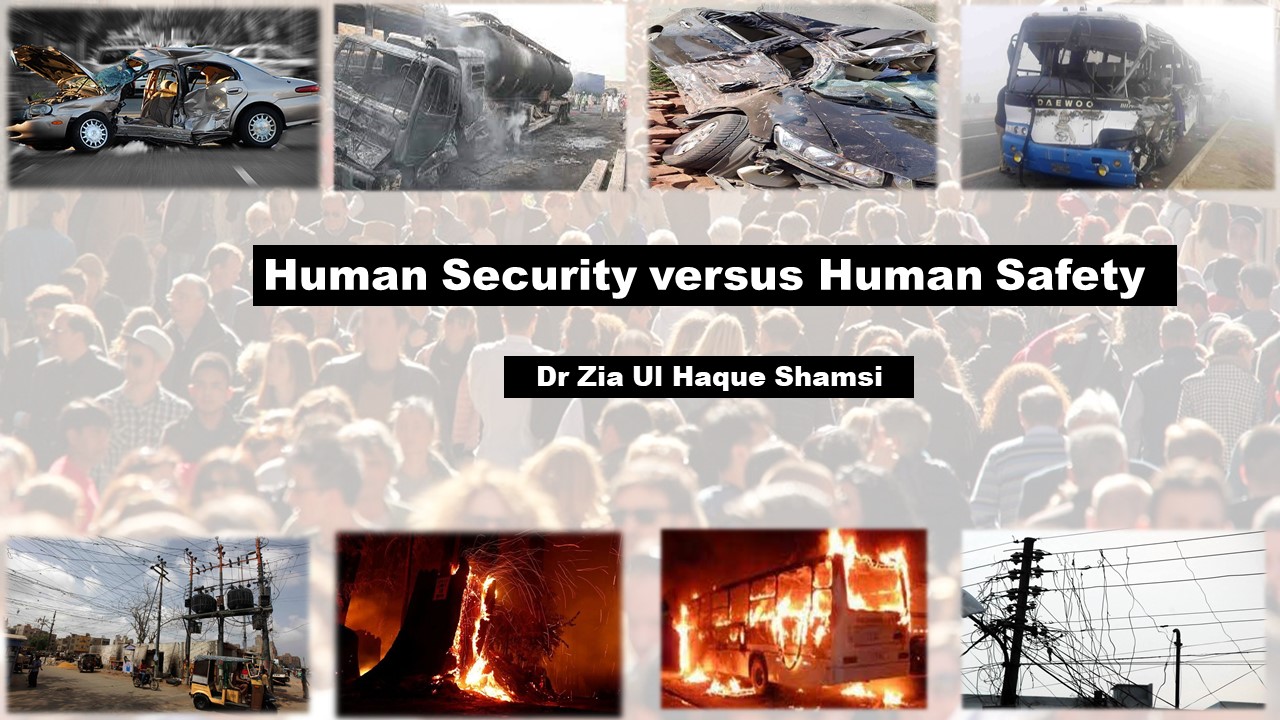While there is a lot of emphasis on human security in the recently released National Security Policy of Pakistan, and rightly so, I do not see enough attention to human safety, unless it is assumed that the two terminologies or concepts have been used synonymously.
In a developing country like Pakistan, where human security in its true sense remains a dream, human safety is equally important, if not more so. Fatalities in road accidents, electrical shocks, gas leakages, and falling into open drains, perhaps number more than the deaths due to security-related incidents.
Culturally, we are not very safety conscious people and do not hesitate in taking unwarranted risks. The Pakistan Bureau of Statistics (PBS) has recently released decade-long data on traffic accidents, which reveals that over 100,000 accidents were reported in which more than 44,000 people lost their lives.
Another safety hazard area that leads to unfortunate incidents leading to uncalled for deaths is the electrical short-circuiting due to poorly maintained distribution systems, obsolete wirings, and lack of awareness about the seriousness of the impending consequences. According to the National Electric Power Regulatory Authority (NEPRA), more than 800 people died in incidents related to electrocution in the last five years.
It is important to mention the tragic incidents which occurred on Murree Hills due to excessive snowfall on 8 January 2022, which led to the unfortunate deaths of nearly 25 innocent tourists due to the inaction of the local administration and the non-existence of health and safety contingency procedures.
Therefore, in my opinion, it is necessary to understand the difference between human security and human safety; only then human safety would find its rightful place in our government’s priorities.
In an evolving paradigm, human security deals with an array of elements – from personal security to environmental security, and from economic security to food and health security; whereas, human safety relates to an individual or group’s physical safety from injury, or fatality from incidents, accidents, and routine or special events. For instance, a traffic accident due to callous mistakes or sheer negligence of the law by those involved must be treated separately than an accident caused due to a poor traffic signal system or the absence of that at a critical junction. Similarly, electrocution due to mishandling of electrical equipment must not be treated in the same way as people, especially children, electrocuted on the streets after rains due to poor installations and lack of administrative capacities to deal with a little extra rainfall.
According to the Australian Bureau of Statistics, 75% of workplace fatalities take place in the transport, agriculture, mining, construction and warehousing sector etc. However, in Pakistan, perhaps this percentage is more due to lack of awareness about basic safety rules, absence of requisite safety equipment, near absence of health and safety contingency procedures, and the practice of a safety culture. At workplaces, accidents and incidents caused due to a poor safety environment are common in Pakistan. Numerous incidents are reported about lack of access for fire-fighting vehicles, absence of installed fire hydrant systems, ambulance services in industrial complexes, and lack of requisite safety services in warehouses, etc. While each building is supposed to have certain basic safety features as part of its design approval processes, unfortunately, we only learn about the absence of the same once an occurrence takes place. According to Law Insider, a “Health and Safety Plan means a documented plan which addresses hazards identified and includes safe work procedures to mitigate, reduce or control the hazards identified.”
I am cognizant of the fact that we are not culturally safety-minded people, but that also falls in the domain of a state’s responsibility to create a safety culture through concerted awareness campaigns, and the creation of an enabling environment at workplaces in the public and private sector organisations. The state must make an effort to orientate people about the criticality of human safety in the same way it is doing about human security.
Perhaps, it is necessary to mention that a fatal accident caused by an authorised driver would be categorised as an ‘accident’, but the same caused by an unlicensed driver is to be treated as a murder. It has now become a common practice that young children drive motorbikes and cars without requisite documents, yet without any fear of punishment by the authorities. Similarly, cases related to accidental shooting deaths in Pakistan have been on the rise, especially during domestic festivities and annual celebrations, but the same is not given any serious consideration by the authorities.
Given the above, at times, it appears that human security has caught the attention of the present government, but human safety considerations are still an alien concept.
Dr Zia Ul Haque Shamsi is the author of ‘Nuclear Deterrence and Conflict Management Between India and Pakistan’ (2020) and ‘South Asia Needs Hybrid Peace’ (2021). He is presently working as Director at the Centre for Aerospace & Security Studies (CASS), Islamabad, Pakistan. The article was first published in Daily Times. He can be reached at cass.thinkers@gmail.com.
Image Source: Etfa Khurshid Mirza




